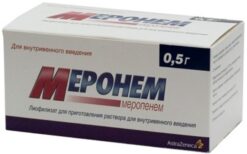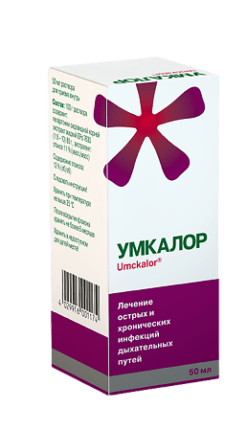-
×


-
×


Subtotal: €111.99
€7.24 €6.34
A cough suppressant, has expectorant, moderate bronchodilator and anti-inflammatory effect.
Butamyrate citrate is neither chemically nor pharmacologically related to opium alkaloids and has a direct effect on the cough center, improves spirometry and blood oxygenation.
Pharmacokinetics
Absorption is high.
After oral administration of a syrup containing 150 mg of butamirate citrate, the maximum plasma concentration of the main metabolite (2-phenyl butyric acid) is observed after 1.5 h and is 6.4 µg/ml; when taking the modified-release tablet (50 mg), it is 9 h and 1.4 µg/ml, respectively.
The elimination half-life for syrup is 6 h, for tablets 13 h. There is no cumulative effect. Butamyrate citrate is rapidly hydrolyzed in plasma to 2-phenyl butyric acid and diethylaminoethoxyethanol.
Both of these metabolites, which also have antitussive effects, are largely bound to plasma proteins, which explains their prolonged presence in plasma.
The main metabolite 2-phenyl butyric acid is further oxidized to 14C-p-hydroxy-2-phenyl butyric acid.
All three metabolites are excreted by the kidneys, with the acidic metabolites mostly bound to glucuronic acid.
Suppression of cough in the preoperative and postoperative period, during surgical interventions, bronchoscopy. Dry cough of any etiology (for colds, flu, whooping cough and other conditions).
Antitussive, has an expectorant, moderate bronchodilator and anti-inflammatory effect.
Butamirate citrate is neither chemically nor pharmacologically related to opium alkaloids and has a direct effect on the cough center, improves spirometry and blood oxygenation.
Pharmacokinetics
Absorption is high.
After oral administration of syrup at a dose containing 150 mg of butamirate citrate, the maximum plasma concentration of the main metabolite (2-phenylbutyric acid) is observed after 1.5 hours and is 6.4 μg/ml, when taking a modified-release tablet (50 mg), respectively, 9 hours and 1.4 μg/ml.
The half-life for syrup is 6 hours, for tablets – 13 hours. There is no cumulative effect. Butamirate citrate is rapidly hydrolyzed in plasma into 2-phenylbutyric acid and diethylaminoethoxyethanol.
Both of these metabolites, which also have an antitussive effect, are largely bound to plasma proteins, which explains their long-term presence in the plasma.
Subsequently, the main metabolite 2-phenylbutyric acid is oxidized to 14C-p-hydroxy-2-phenylbutyric acid.
All three metabolites are excreted by the kidneys, with acidic metabolites mainly associated with glucuronic acid.
Omnitus® 20 mg tablets are contraindicated in children under 6 years of age. Due to the fact that butamirate suppresses the cough reflex, the simultaneous use of expectorants should be avoided to avoid the accumulation of sputum in the respiratory tract with the risk of developing bronchospasm and respiratory tract infection.
Butamirat
Butamirat
1 modified-release film-coated tablet 50 mg contains: active ingredient: butamirate citrate – 50 mg; excipients: lactose monohydrate, hypromellose, talc, magnesium stearate, colloidal silicon dioxide, povidone; shell composition: hypromellose, talc, ethylcellulose, macrogol, titanium dioxide, crimson dye [Ponceau 4R] [E 124], brown varnish (sunset yellow dye [E110], azorubine dye [E122], brilliant black dye [E151]).
Contraindicated during lactation, pregnancy, children and adolescents under 18 years of age.
Hypersensitivity to the components of the drug, pregnancy (first trimester), breastfeeding period, children under 6 years of age – 20 mg tablets, children under 18 years of age – 50 mg tablets. Lactose intolerance, lactase deficiency, glucose-galactose malabsorption (the drug contains lactose).
Classification of the frequency of adverse reactions: very often (≥1/10), often (≥1/100, <1/10), infrequently (≥1/1000, <1/100), rarely (≥1/10000, <1/1000), very rarely (<1/10000), including isolated cases. From the central nervous system: rarely - dizziness, drowsiness. From the digestive system: rarely - nausea, diarrhea. Allergic reactions: rarely - skin rash, itching, urticaria.
Symptoms: nausea, vomiting, drowsiness, diarrhea, dizziness, decreased blood pressure.
Treatment: orally – activated carbon, saline laxatives, if necessary – symptomatic therapy.
Modified-release film-coated tablets 20 mg or 50 mg. 10 tablets in a blister made of aluminum foil and polyvinyl chloride film. 1 blister along with instructions for medical use of the drug in a cardboard pack.
Tablets: At a temperature not exceeding 25 °C in consumer packaging. Keep out of the reach of children.
Tablets: 2 years. Do not use after the expiration date stated on the package.
Hemofarm A.D., Serbia
| Shelf life | Tablets: 2 years. Do not use after the expiration date stated on the package. |
|---|---|
| Conditions of storage | Tablets: At a temperature not exceeding 25 °C in a consumer package. Keep out of reach of children. |
| Manufacturer | Chemopharm A.D., Serbia |
| Medication form | controlled release tablets |
| Brand | Chemopharm A.D. |
Buy Omnitus, 50 mg 10 pcs with delivery to USA, UK, Europe and over 120 other countries.